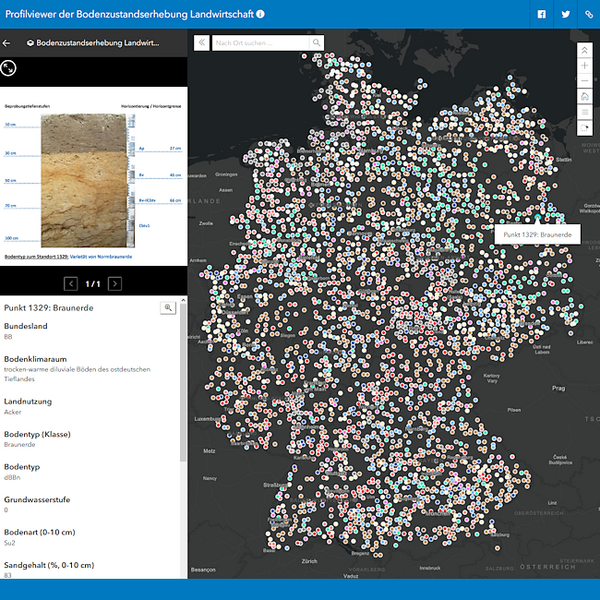
The German Agricultural Soil Inventory (BZE-LW) is the first nationwide, uniform inventory of agricultural soils. On behalf of the Federal Ministry of Food and Agriculture, the organic carbon stocks down to a depth of one meter in agricultural soils throughout Germany were recorded for the first time between 2011 and 2018. The influence of site and management factors was assessed on soil organic carbon (SOC) stocks in a grid of 8 x 8 km. The initial BZE-LW was based on the voluntary participation of 3,104 farmers. Its main purpose was the scientific validation and further development of Germany's greenhouse gas emission reporting within the framework of the United Nations Framework Convention on Climate Change (UNFCCC) and the Kyoto Protocol.

These greenhouse gas emissions include carbon dioxide (CO2), which is produced by the microbial decomposition of organic carbon in the soil. Worldwide, more carbon is stored in soils than in the atmosphere and vegetation combined, which is why even relatively small increases in the stock of soil organic carbon can make an important contribution to reducing CO2 concentrations in the atmosphere. In Germany, agricultural soils are the largest carbon store among terrestrial ecosystems, holding 2.5 billion tons of carbon. The change in SOC stocks must therefore be recorded, analyzed and reported as accurately and representatively as possible. Climate change, current management as well as land use and management history contribute to possible changes in these stocks.
At the end of 2018, the final report of the initial BZE-LW was handed over to the Federal Ministry of Food and Agriculture in Berlin. The report can be downloaded as "Thünen Report No. 64" (only German version). "Kurzfassung des Abschlussberichts der BZE-LW" is a shortened version of the final report in which selected results are summarized in an easily understandable way (only German version). The results of the German Agricultural Soil Inventory will continue to be published in English in peer-reviewed articles (see Results & Publications).
The Thünen Institute of Climate-Smart Agriculture was commissioned by the Federal Ministry of Food and Agriculture to resample the points of the BZE-LW in the years 2023-2029 in order to determine possible changes in SOC stocks. In addition to site-specific and climatic factors, management data is collected via a questionnaire and provided information on possible changes. Among other applications, the knowledge gained from the 8 x 8 km grid will help to validate the area-wide modelling of SOC stocks within the framework of the national greenhouse gas reporting. A minimum interval of 10 years between samplings will be maintained at all points. The BZE-LW will be carried out again by the Thünen-Institute of Climate-Smart Agriculture and will continue to focus on SOC stocks. There are, however, some methodological and analytical adjustments being made (see Methodology).
Soil profile-Viewer
Explore 3,104 soil profiles and their characteristic values in an interactive application.
The BZE-LW is the first comprehensive and uniform inventory of German agricultural soils. The visual perception of soil characteristics plays a central role in soil science. Therefore, accompanying the core data set of our Soil Inventory, the Thünen Institute has published a WebGIS application in which all 3,104 soil profiles are presented together with some essential characteristic values in their distribution in Germany. The diversity of our agricultural soils can thus also be experienced visually.
Open Data Access for BZE-LW Data
The BZE-LW core dataset, including the most important data collected in the laboratory and field, is published on OpenAgrar and is available for download. The latest BZE-LW publications and their associated data are publicly available on ZENODO.
Links:

![[Translate to English:] [Translate to English:]](/media/_processed_/6/4/csm_titel_CO2Kampagne8_afeea2273e.png)
![[Translate to English:] [Translate to English:]](/media/_processed_/4/1/csm_titel_93px_CO2Kampagne8_9b0f3354d4.png)






